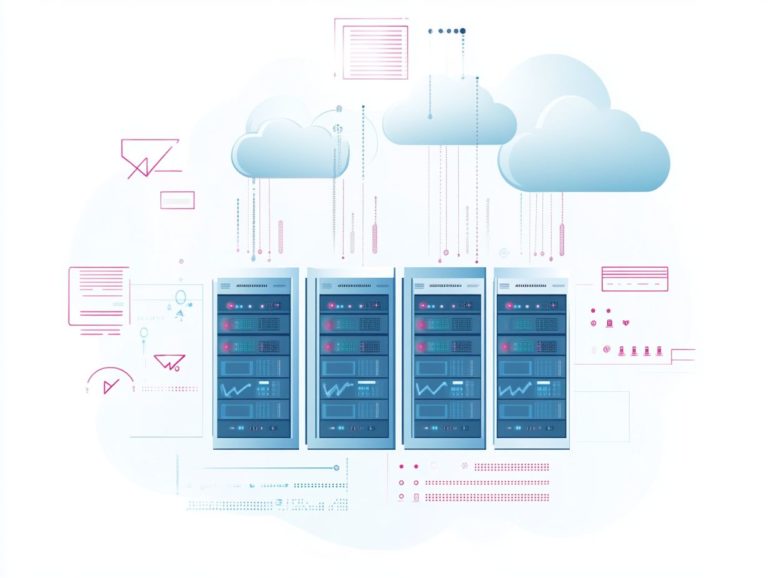5 FAQs About IaaS Answered
Infrastructure as a Service (IaaS) is a way to rent computing resources like servers and storage over the internet, providing a flexible and scalable solution tailored to modern computing demands.
This article addresses crucial questions about IaaS, including what it is, how it compares to other cloud models, and the myriad benefits and potential drawbacks it offers.
You ll also learn how to assess whether IaaS aligns with your business needs, its key features, and the common misconceptions surrounding it.
Dive in to discover how IaaS can transform your organization s tech landscape!
Contents
Key Takeaways:
- IaaS is a cloud computing model that provides virtual resources such as servers, storage, and networking infrastructure on a pay-per-use basis.
- IaaS offers benefits like cost savings, the ability to grow or shrink resources as needed, and flexibility, but potential drawbacks include data security concerns and limited control over infrastructure.
- Businesses should carefully evaluate their needs and consider factors like cost, data security, and scalability when determining if IaaS is the right fit for them.
1. What Exactly Is IaaS?
IaaS is an essential element of cloud computing that offers you virtualized computing resources over the internet, freeing your IT team from the physical shackles of traditional data centers.
With industry giants like AWS and Microsoft Azure at the forefront, IaaS gives you the power to scale your operations with remarkable efficiency while optimizing IT costs and enhancing your cloud strategy for a robust architecture and flexible infrastructure.
This model transforms how you approach your IT requirements, emphasizing a pay-as-you-go structure that significantly reduces capital expenditures.
A key highlight of IaaS is the availability of virtual machines, allowing you to run multiple operating systems on a single physical server, maximizing resource utilization.
The agility and scalability offered by cloud providers enable you to swiftly adapt to shifting demands without the burden of costly hardware investments. This reduced reliance on physical infrastructure not only lowers maintenance costs but also boosts operational efficiency, making IaaS an appealing option for companies eager to streamline their IT operations.
2. How Does IaaS Differ from Other Cloud Computing Models?
IaaS sets itself apart from other cloud computing models like Platform as a Service (PaaS) and Software as a Service (SaaS) by offering foundational infrastructure. This model provides you with greater control over your cloud environment, allowing for the flexibility to configure resources tailored to your specific business needs.
While PaaS offers a platform for developers to create applications without the hassle of managing the underlying hardware, and SaaS delivers software solutions directly to end-users, IaaS distinguishes itself by granting you significant management capabilities.
Scalability is vital within IaaS, enabling you to adjust your resources in real time based on demand, ensuring optimal performance.
Understanding these distinctions can immensely benefit your business during cloud migration, giving you the power to select the model that best aligns with your operational requirements and long-term growth aspirations.
3. What Are the Benefits of Using IaaS?
The benefits of using Infrastructure as a Service (IaaS) are impressive, offering you enhanced scalability, cost-effectiveness, and flexibility. However, it’s also important to be aware of the 5 IaaS adoption challenges and solutions to tailor your cloud strategy while ensuring robust cloud security and efficient data backup solutions.
One standout advantage is the potential for significant cost savings. You can eliminate hefty upfront investments in physical infrastructure and opt for a pay-as-you-go model that aligns perfectly with your actual usage.
IaaS also simplifies the cloud migration process, providing pre-configured environments that minimize deployment challenges and allow for a smoother transition.
Improved disaster recovery options are another major benefit, enabling you to quickly restore operations without the hassle of managing hardware. This service can dynamically adapt to your changing business needs, scaling resources up or down based on demand while addressing critical data residency requirements to ensure compliance with regulatory standards.
IaaS truly offers a comprehensive solution to meet modern IT demands.
Ready to transform your IT? Explore IaaS today!
4. What Are the Potential Drawbacks of IaaS?

IaaS offers many benefits, but it also has drawbacks. Key concerns include cloud security, compliance issues, and vendor lock-in, which can complicate your IT costs and planning.
Relying on third-party vendors might leave you vulnerable to cyber threats. You ll also need to navigate complex laws about where data can be stored to ensure compliance across regions.
These challenges could introduce significant operational risks. Mismanagement might hinder growth and damage customer trust.
5. How Can a Business Determine If IaaS Is Right for Them?
Start by assessing your current IT infrastructure and cloud strategy. Look at factors like scalability, cost, and vendor capabilities.
Create a checklist to see how well IaaS meets your needs. Analyze your current workloads and identify performance bottlenecks.
Your IT team should consider potential migration challenges, such as data transfer risks and integrating older systems.
Assess how IaaS solutions can streamline your processes and support growth.
What Are the Key Features of IaaS?
IaaS provides on-demand resources and scalability. This flexible framework allows you to allocate resources efficiently without heavy hardware investments.
With seamless scaling, you can adapt easily to workload changes for optimal performance. IaaS also supports multiple applications on a single server, resulting in cost savings.
This environment boosts efficiency and allows for rapid innovation, helping you respond to market changes quickly.
What Are the Different Types of IaaS Providers?
Leading IaaS providers like AWS and Microsoft Azure offer public, private, and hybrid cloud models. Choose based on your business needs and resource control preferences.
Public clouds offer flexible scaling and cost savings, while private clouds provide enhanced security and control. Hybrid solutions combine both environments, optimizing performance and security.
Your choice will depend on your operational demands, budget, and data sensitivity.
How IaaS Keeps Your Data Safe

IaaS offers exceptional data security through robust cloud security features, including encryption, following industry rules, and comprehensive disaster recovery plans designed to protect your sensitive information and ensure operational continuity.
These security features are essential for organizations like yours that handle sensitive data, as they effectively mitigate the risks of data breaches and unauthorized access.
By implementing strong user access controls, you can precisely manage who has the authority to view or manipulate data, ensuring that only authorized personnel gain access to critical information.
The various security certifications that IaaS providers typically uphold, such as GDPR and HIPAA, reflect a commitment to maintaining the highest security standards.
In terms of disaster recovery planning, IaaS excels by offering scalable solutions that enable your organization to swiftly restore operations and protect data integrity, minimizing downtime in the face of unexpected incidents.
Common Misconceptions About IaaS
Common misconceptions about Infrastructure as a Service (IaaS) might lead you to think it demands extensive management or is only for large enterprises, which could cause you to overlook the significant benefits it offers to smaller businesses.
In reality, IaaS is crafted to be user-friendly and scalable, catering to organizations of all sizes. Many assume that adopting IaaS involves navigating complex configurations and ongoing monitoring. However, cloud providers frequently offer streamlined management tools and support, along with 5 key features of modern IaaS solutions that make things easier.
Small and medium-sized enterprises stand to gain immensely from the flexibility and cost-efficiency that IaaS provides, allowing you to innovate and swiftly respond to market demands without the hassle of maintaining physical infrastructure.
By grasping these capabilities, you can leverage IaaS as a powerful asset in your digital transformation journey.
IaaS: Your Key to Scalability and Flexibility
IaaS elevates your scalability and flexibility, allowing you to swiftly provision and deprovision virtual machines and resources according to your needs. This adaptability means you can respond to fluctuating workloads without the burden of significant capital investment.
During peak sales seasons or unexpected market shifts, you can immediately boost your computing capabilities, ensuring your operations run smoothly. For instance, if you’re in retail and face a surge of customer traffic during the holidays, you can quickly scale up your cloud infrastructure to handle the increased transactions, guaranteeing an uninterrupted shopping experience.
When demand wanes, you can effortlessly downsize your resources, optimizing your costs. In industries like entertainment, where streaming services may see spikes in user engagement due to the release of popular shows, the ability to seamlessly adjust capacity is crucial for maintaining user satisfaction.
Understanding IaaS Costs
Costs associated with Infrastructure as a Service (IaaS) can vary significantly depending on the pricing models offered by cloud vendors, such as pay-as-you-go and subscription options. It s crucial for you to assess your expected IT operational costs and budget accordingly.
Understanding how these models function is essential, as they have a direct impact on your overall expenses. For instance, the pay-as-you-go model enables you to pay solely for the resources you consume, which can be advantageous if your demand fluctuates. Conversely, while subscription models may provide predictable costs, they could also lead to overpayment if you don’t closely monitor resource utilization.
Factors like your storage requirements, the amount of compute power you need, and any optional services such as backup or security solutions can significantly influence pricing. Therefore, you must engage in diligent cost management to optimize your investments while ensuring you secure the resources necessary for operational efficiency.
Frequently Asked Questions

What is IaaS?
IaaS stands for Infrastructure as a Service, and it is a cloud computing model where the provider hosts and manages the infrastructure for customers. This includes servers, storage, networking, and virtualization.
Why should your business consider IaaS?
IaaS, or Infrastructure as a Service, offers many advantages, including cost savings, scalability, and understanding the 5 must-know IaaS concepts.
It helps businesses save money on buying and keeping their own hardware. Instead, they only pay for the resources they need.
Scalability is another key benefit. Businesses can quickly add or remove resources as necessary. The flexibility of IaaS helps businesses customize their infrastructure to meet specific needs.
How is IaaS different from other cloud computing models?
IaaS provides the most control and flexibility compared to other cloud computing models like Platform as a Service (PaaS) and Software as a Service (SaaS).
With IaaS, users have full control over their infrastructure and can customize it to suit their requirements. In contrast, PaaS and SaaS solutions tend to offer more pre-built options.
What types of businesses can benefit from using IaaS?
A wide range of businesses can benefit from IaaS, from small startups to large enterprises.
Small businesses especially appreciate the cost savings and scalability of IaaS, while larger enterprises can use it to supplement existing infrastructure or for specific projects.
What security measures are in place for IaaS?
IaaS providers implement various security measures to protect customer data, including firewalls, encryption, and regular backups.
Choosing a reputable IaaS provider is essential to ensure the security of your data.
What are the potential drawbacks of using IaaS?
Despite its many advantages, IaaS has potential drawbacks to consider.
One major concern is the reliance on the IaaS provider’s infrastructure, which could lead to costly downtimes or service interruptions if problems occur on their end.
Moreover, some businesses may lack the resources or expertise to take full advantage of IaaS’s flexibility and customization options.






